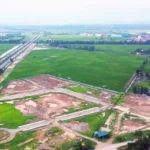A draft decree amending and supplementing several articles of the Government’s Decree No. 103, dated July 30, 2024, stipulating land use fees, land rental, and Decree No. 104 on the Land Development Fund, is currently under consultation by the Ministry of Finance. This has attracted special attention from enterprises.
The reason for this lies in the draft’s retention of the stipulation that cases with decisions on land allocation, land lease, land-use purpose conversion, or transition from annual land rental to one-time land rental, as well as detailed planning adjustments, must pay a supplement for the period when land use fees or land rent were not calculated. The rate is set at 5.4%/year, calculated based on the amount to be paid.
Unreasonable in Both Emotion and Logic
We are aware that the additional land money to be paid when the land use fee has not been calculated is unreasonable. Still, enterprises have to comply because, at that time, the land will be included in the project for exploitation and meet the conditions for sale.
This was shared by Mr. Nguyen Quoc Hiep, Chairman of GP.Invest and the Vietnam Construction Contractors Association, with VietNamNet’s reporter.
He informed that, in addition to the land use fee of nearly VND 500 billion, the enterprise itself had paid about VND 27 billion in supplementary land money for a project in Phu Tho province.
However, the Chairman of GP.Invest said that this amount is not too large, as there are other enterprises that have to pay much higher supplements because they have received land allocation decisions since 2014, and more than ten years have passed.
“This is unreasonable. The fault for the late payment of land use fees does not lie with the enterprise, but the enterprise has to bear the brunt. We have proposed many times, but the Ministry of Finance has not agreed. In the localities where we implement projects, they also acknowledge that this collection is unreasonable, but they cannot propose because they are law enforcement agencies,” said Mr. Hiep.
 Enterprises proposed eliminating the regulation on supplementary land use fees due to its unreasonableness. Photo: Hoang Ha
|
Mr. Pham Duc Toan, General Director of EZ Property, expressed that if a project has not been appraised for land value, requiring enterprises to pay supplementary land use fees is unreasonable in both emotion and logic.
“Some localities require enterprises to complete their land use payment obligations before granting construction permits. Land valuation is the responsibility of the state. It is unreasonable to penalize enterprises for something that is not their fault,” Mr. Toan frankly stated.
Meanwhile, the delay in calculating land use fees causes significant losses for enterprises. This includes prolonged project implementation, resulting in increased costs due to land price increases year after year.
He analyzed that 5.4%/year, calculated on the amount of land money to be paid for the period when the land use fee was not calculated, is a considerable penalty. For example, if a project has a land use fee of VND 1,000 billion, and the State delays calculating the land use fee for only one year, the enterprise will have to pay an additional VND 54 billion.
If enterprises are late in paying taxes, the tax sector stipulates a high penalty interest rate of 0.03%/day if the land use fee is not fully paid within 90 days from the notification of payment.
Mr. Toan worries that enterprises will be burdened with tax-on-tax as a result.
Sharing the same view, Mr. Vu Cuong Quyet, General Director of Dat Xanh Northern, stated that determining the land use fee is the responsibility of the government authorities.
“Many projects are ‘soaked’ for 3-5 years before the land use fee is determined, after which enterprises are subject to a penalty of 5.4%/year on the amount not paid during the waiting period for land price determination. This regulation disadvantages enterprises because the delay in payment is not their fault, but they still have to pay the penalty,” Mr. Quyet shared with VietNamNet’s reporter.
The leader suggested that the land price is currently determined based on market prices and adjusted annually. As market prices increase yearly, the longer it takes for the state to determine the land use fee, the higher the cost for enterprises.
“Land prices, along with penalty amounts and other costs, will be included in the selling price, and buyers will ultimately bear these costs,” Mr. Quyet noted.
Proposal to Eliminate Supplementary Land Money
Given this reality, EZ Property’s General Director, Mr. Pham Duc Toan, proposed eliminating the regulation on supplementary land use fees.
“In cases of delayed land price determination, the responsibilities of related units should be clearly defined. Land money should only be collected when the state has issued specific land prices.
Some localities are reluctant to determine land prices due to risk concerns, resulting in a situation where no projects are determined for financial obligations regarding land for many years. The problem lies in the mechanism; if this is resolved, implementing officials will be confident in carrying out the task, instead of shifting responsibility to enterprises,” said Mr. Toan.
Mr. Nguyen Quoc Hiep proposed that the Ministry of Finance reconsider this highly unreasonable policy.
According to him, this additional land money collection clause should be eliminated. In cases of delayed decisions on land use fee collection, the land price determination agency must be held accountable. At the same time, the transitional condition should be amended, and enterprises that have already complied should be allowed to deduct the amount.
Moreover, if the state calculates the land tax late, enterprises should be exempt from penalty fees, suggested the leader of Dat Xanh Northern.
He proposed that the state stipulate that from the date of the land allocation or lease decision, the financial obligations regarding land must be determined within a maximum period of 3-9 months or, at the latest, one year. If this deadline is missed, enterprises should be exempt from late payment penalties. This will create pressure and compel the competent authorities to promptly determine land prices, avoiding situations where projects are ‘soaked’ for many years.
“Unblocking land price determination will increase supply, thereby preventing real estate prices from escalating,” Mr. Quyet proposed.
Nguyen Le
– 06:15 10/06/2025
The High Cost of Land Usage: A Challenge for Businesses and its Impact on Housing Prices
The real estate industry is facing a peculiar dilemma with land use fees being extraordinarily high and, at times, unpredictable. This predicament has left many businesses in a state of flux, unable to proceed with projects and concerned about the potential impact on housing prices.
“Experts Denounce Supplementary Land Use Fee Collection as Unreasonable: Delayed Land Valuation Not the Fault of Enterprises”
“The recent regulation mandating supplementary land-use fee payments has been deemed unreasonable by experts. They argue that delays in land price determination are often due to bureaucratic lag rather than enterprise inaction. This discrepancy highlights the need for a more nuanced approach that considers the complexities involved in land valuation and enterprise operations.”





















